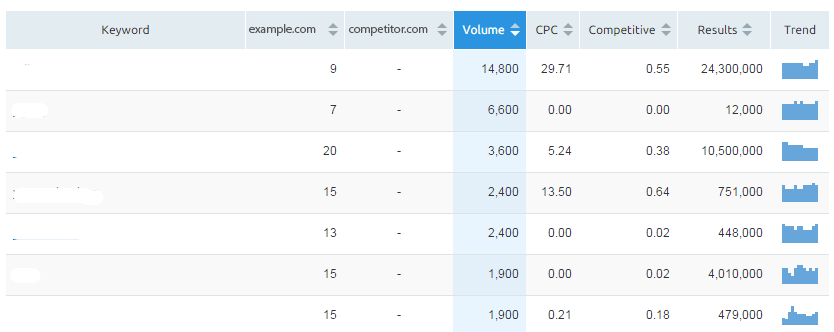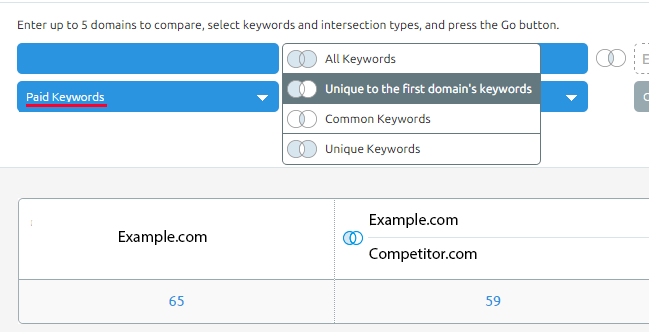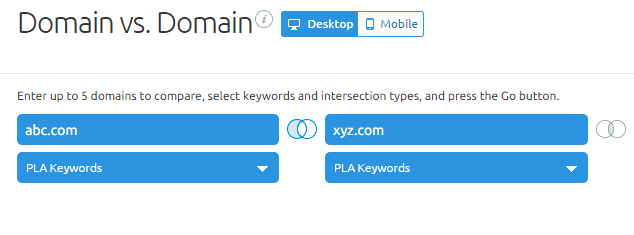Posted on 7/16/2015 in Digital Marketing
Nowadays, there are plenty of tools you can take advantage of to monitor your competition. My tool of choice recently has been SEMRush, which provide a wealth of information on both your sites and your competitors if you are curious enough. With SEMRush, there are specific questions you can answer if you really want to know what your most aggressive competitor is doing.
Here are the top questions I answer using SEMRush:
- Which ORGANIC key phrases my competitor is ranking for in Google that I am not?
- Which PAID key phrases my competitor are ranking for that I am not?
- Which keywords is my competitor ranking for in PLA results that I am not?
- Which keywords are my top competitor ranking for in Mobile devices and I am not?
If you have never used SEMRush, answering these questions could take some time, as you will need to get used to the tool. To make it easier, I have walked you through the steps to answering each question below:
1. Which ORGANIC key phrases my competitor is ranking for in Google that I am not?
Go to “Tools” and choose Domain vs. Domain, then choose “Desktop”

Type first your competitor’s domain name and then your domain name, then click “GO”

Click on “Enable Charts”

Select “Unique to the first domain’s Keywords” Option, choose “Organic Keywords” from the drop-down menu, then click “GO”

Then you will see a table like this one. Now you know that you can download 239 keywords that the competitor is ranking for and you are not.

To Download the 239 keywords, click on the “Table View” option

Now you will see a table like the one below:

Now you can export the table in 3 formats: Excel, CSV, and CSV Semicolon.
2. Which PAID key phrases my competitor are ranking for that I am not?
This task is also simple via SEMrush.com. Just follow the above steps, but, instead of “Organic Keywords”, choose “Paid Keywords”

Voila, as you can see, the competitor has 59 keywords that they are paining to rank in search results that you are NOT.
3. Which keywords is my competitor ranking for in PLA results that I am not?
Similar to the previous question, follow the steps described above and choose “PLA Keywords”, then hit “GO”

After that, you can download the list of Product Listing Ads keywords that your competitor is ranking in the search results. Watch this video if you would like to learn more about PLAs!
4. Which keywords are my top competitor ranking for in Mobile devices and I am not?
To retrieve this data from SEMrush.com it is quite simple too. Just choose “Mobile”, instead of “Desktop” and repeat all steps mentioned in Question 1.

Conclusion:
Competitor online monitoring is essential nowadays to stay ahead of the pack in every industry, and leveraging competitive analysis tools is the best way to obtain the data that will give you the edge in terms of grabbing the attention of your target audience. SEMrush provides a unique set of reports that will help you accomplish such a goal. By knowing the keywords your competitor is ranking for and you are not, you can design a content strategy that will match and exceed those of your competitor.
Related Articles

How Do I Optimize My Website for AI?
Why do you need to optimize your website for AI?AI-powered search engines like Google’s AI Overview, Perplexity, and tools such as Microsoft's [...]

Outdated or Outstanding? How to Tell If Your Website Needs a Refresh
Your website is the digital face of your business. It serves as a first impression, a marketing tool, and a resource for potential customers. [...]

Preparing a Website Redesign Budget for 2025: A Step-by-Step Guide
As we approach 2025, businesses are recognizing the necessity of a fresh, user-friendly website to stay competitive in a rapidly evolving digital [...]
